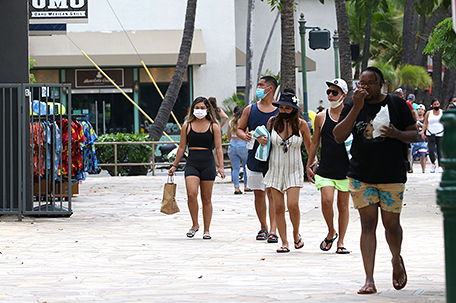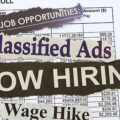
ABOVE PHOTO: People walk past shops in the Waikiki neighborhood of Honolulu, Tuesday, Aug. 24, 2021. Hawaii was once seen as a beacon of safety during the pandemic because of stringent travel and quarantine restrictions and overall vaccine acceptance that made it one of the most inoculated states in the country. But the highly contagious delta variant exploited weaknesses as residents let down their guard and attended family gatherings after months of restrictions and vaccine hesitancy lingered in some Hawaiian communities.(AP Photo/Caleb Jones)
By Christopher Rugaber
ASSOCIATED PRESS
WASHINGTON — America’s employers added just 235,000 jobs in August, a surprisingly weak gain after two months of robust hiring and the clearest sign to date that the delta variant’s spread has discouraged some people from flying, shopping and eating out.
The August job growth the government reported Friday fell far short of the sizable gains of roughly 1 million in each of the previous two months. The hiring jumps in June and July had followed widespread vaccinations that allowed the economy to fully reopen from pandemic restrictions. Now, with Americans buying fewer plane tickets, reducing hotel stays and filling fewer entertainment venues, some employers in those areas have slowed their hiring.
Still, the number of job openings remains at record levels, with many businesses eager for workers, and hiring is likely to rebound in the coming months. Even last month’s modest job growth was sufficient to lower the unemployment rate to 5.2% from 5.4% in July. With consumers willing to spend and companies trying to hire, the U.S. economy looks healthy.
The details of Friday’s jobs report showed how the delta variant held back job growth last month. The sectors of the economy where hiring was weakest — restaurants, hotels and retailers — were mainly those that require face-to-face contact with the public. More Americans said they were unable to work in August because their employer closed or lost business to the pandemic than said so in July.
Hiring in the category that includes restaurants, bars and hotels sank to zero in August after those sectors had added roughly 400,000 jobs in both June and July. Restaurant dining, after having fully recovered in late June, has declined to about 9% below pre-pandemic levels, according to reservations website OpenTable.
Some live shows, including the remaining concerts on country star Garth Brooks’ tour, have been canceled. Businesses are delaying their returns to offices, threatening the survival of some downtown restaurants, coffee shops and dry cleaners.
“The delta variant has taken a bigger toll on the job market than many of us had hoped,” said Sarah House, a senior economist at Wells Fargo. “It’s going to take workers longer to come back to the labor market than we expected.”
As a consequence, many economists now predict that the Federal Reserve won’t make a long-awaited announcement that it will begin dialing back its low-interest rate policies until November or later.
The August jobs report “slams the door” on the prospect of the Fed announcing a pullback when it meets later this month, House said. Fed Chair Jerome Powell made clear last week that the central bank would begin to reverse its ultra-low-rate policies later this year if the economy continued to improve.
A lack of available workers remains a major hurdle to robust hiring. A few months ago, many economists had expected a fading pandemic to encourage more people to resume their job searches. Worries about getting sick on the job would fade, they hoped. And as schools reopened, more parents, particularly women, would return to the workforce.
So far, that hasn’t happened. But the demand for workers remains strong. The job listings website Indeed says the number of available jobs grew in August.
And the National Federation for Independent Business said its surveys show that half of small businesses have jobs they cannot fill.
Across the economy, that difficulty is compelling employers to offer higher pay. Average hourly wages rose a robust 4.3% in August compared with a year earlier.
Walmart announced this week that it will hire 20,000 people to expand its supply chain and online shopping operations, including jobs for order fillers, drivers, and managers. Amazon said Wednesday that it is looking to fill 40,000 jobs in the U.S., mostly technology and hourly positions.
And Fidelity Investments said Tuesday that it is adding 9,000 more jobs, including in customer service and IT. In such sectors, where face-to-face contact with the public isn’t generally required, hiring remains strong.
Among the beneficiaries is Hailey Uejo, who began working Aug. 1 as a project manager at VIDSIG, a San Francisco-based company that provides a live video chat platform whereby customers can interact with celebrities and experts. Previously, Uejo, 24, had worked as a special education teacher. But she felt burnt out by online classes.
“COVID gave me the excuse to try something new,” she said.
Jonathan Yarnold, CEO of VIDSIG, said the delta variant hasn’t affected his company’s plans to add 20 to 25 jobs.
Likewise, Sean O’Scannlain, chief executive of Fortune International, which imports, processes and distributes seafood, said his company is on track for record sales and has topped pre-pandemic levels. The delta variant hasn’t slowed demand from the higher-end restaurants and grocery stores he supplies.
Yet O’Scannlain said he’s struggling to fill 42 open jobs for truck drivers, warehouse workers, accountants and sales workers. He said he thinks that a $300-a-week federal unemployment supplement, which began in March, discouraged some would-be job seekers.
Other factors, too, O’Scannlain said, have made it harder to hire: Because big companies such as Amazon and Walmart have raised wages, he has had to match their higher pay. Overall, he’s raised pay 10% to 15% from a year ago. And some people fear becoming sick on the job from delta.
“Those fears were easing in the spring as the numbers were coming down,” he said. As infections have spiked, “those concerns have risen again.”
Governors in about 25 states stopped paying the $300-a-week federal jobless benefit in June and July because, they said, the extra money was discouraging recipients from looking for work. Yet the proportion of Americans with jobs or searching for one was flat in August, Friday’s report showed, suggesting that the cutoff has had little impact so far. Some academic research has found that the early cutoffs have led to only a small increase in hiring.
The $300 payment, as well as two federal programs that cover the self-employed and gig workers, and the long-term unemployed, are set to end next week. About 8.9 million people will lose all their unemployment aid as a result.
One of them is Marianne Leblanc. A live-events designer, Leblanc, 58, lives in Las Vegas, where she used to oversee huge corporate displays at conferences such as the Consumer Electronics Show. Once the pandemic hit, all that work dried up.
Leblanc recently accepted a nine-week temporary job that will require her to fly to several cities, many of them with high COVID counts, which she is reluctant to do because she has lupus, which weakens the immune system.
She is also interviewing for a permanent job, but she has seen previous opportunities fall through. She fears losing the home she rents once her jobless aid ends.
“It’s been an emotional roller-coaster for the past year and a half,” Leblanc said, “and it’s just being amplified” by the impending loss of aid.
The hiring slowdown in the U.S. contrasts with an improved picture in Europe, which has passed the U.S. in total vaccine doses and a levelling-off of new infections is helping limit delta’s impact.
Retail and recreation activity in Europe has now exceeded its pre-pandemic level, and European Union officials say they’ve reached their goal of fully vaccinating 70% of adults by summer’s end, a higher proportion than in the U.S. In addition, France, Germany and Italy have restricted the access of unvaccinated people to indoor dining and other activities.

















Leave a Comment